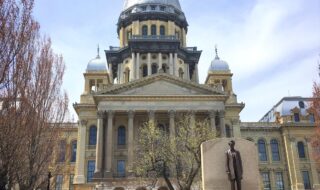October 6, 2025
Bill getting state's water policy right signed into law. Does another measure usurp federal authority?
Welcome to the October 6-10 edition of the Main Street Minute from your small-business-advocacy team in Sacramento.
A Week of Bill Signings by the Governor
One week down. One week to go before the October 12 deadline for Gov. Gavin Newsom to sign or veto bills sent to him by the Legislature. Last week, he signed one good-for-small-business bill that NFIB and its coalition partners had lobbied for him to do. On the flip side, he also signed two measures NFIB and its partners lobbied against. We’ll know this week his decision on two more good bills and 15 bad ones.
The following describe the two bills he acted on and a court decision on a bill passed last session, which NFIB was delighted to hear.
Collective Bargaining
Perhaps if you take enough drags off that hash pipe of being the world’s fourth-largest economy, the mind becomes addled into believing you can do anything. Assembly Bill 288 (McKinnor), which Gov. Gavin Newsom signed into law last Tuesday (September 30), is an example.
In a nutshell, it seeks to enforce workers’ collective bargaining rights for certain private sector employees when the federal National Labor Relations Board (NLRB) fails to act in a “timely manner,” thereby usurping federal authority. It would give these enforcement powers to the state Public Employment Relations Board (PERS).
“Under Assembly Bill 288,” reports CalMatters, “workers with pending cases before the board, including pending union elections, could ask the state to hear the case instead if:
— The National Labor Relations Act is overturned;
— The national board is blocked from acting by Trump or the courts;
— The board’s regional offices take longer than six months to issue a decision;
— Or cases appealed up to the national board take longer than a year to be resolved.
“The federal government’s National Labor Relations Board oversees private-sector workers’ rights to unionize and collectively bargain; California only has jurisdiction over labor disputes among public sector workers and farmworkers.”
But, adds The Sacramento Bee, “AB 288 expands the state Public Employment Relations Board’s powers over private sector labor disputes like unfair labor practice charges and enforcing collective bargaining agreements. Other blue states, including New York, are trying to expand their state labor agencies’ powers over issues that would normally be decided under the National Labor Relations Act, citing Trump’s antipathy to organized labor.
“AB 288 could trigger federal challenges. Acting NLRB General Counsel William Cowen told Bloomberg earlier this month he planned to sue New York after Gov. Kathy Hochul signed a similar bill, which he called a ‘direct attack’ on the federal agency’s authority.”
NFIB and other business groups vigorously opposed AB 288, but could not loosen the stranglehold Big Labor has on the California State Legislature, and this was not a small matter to them. “This is the most significant labor law reform in nearly a century,” said Lorena Gonzalez, president of the California Federation of Labor Unions, AFL-CIO.
Related
News Release: NFIB Pushes Back on New York’s Attempt to Upend Longstanding Labor Law. “Navigating the minefield of local regulations on top of state laws on top of federal mandates is an overwhelming burden for small business owners,” said Beth Milito, Vice President and Executive Director of NFIB’s Small Business Legal Center. “Congress understood this when they passed the National Labor Relations Act (NLRA) as a way to standardize labor law across the country under the exclusive authority of the NLRB. New York’s recent attempt to wrest control over labor-related matters overtly disregards the intent of Congress and threatens to upend the current system of uniform and cohesive labor relations.”
Speaking of Collective Bargaining
The governor also signed Assembly Bill 1340 (Wicks) into law. According to the bill, it would establish that transportation network company (TNC) drivers have the right to form, join, and participate in the activities of TNC driver organizations of their own choosing to engage in other concerted activities for the purpose of collective bargaining or other mutual aid or protection.”
Of course, this couldn’t be just about encouraging unions to muscle in on the rideshare business [Uber, Lyft], it was also a poke in the eye to the Trump administration, according to a news release issued by the governor’s office ballyhooing his action.
And here you thought the rideshare business was a wonderful way for workers already with jobs to make a little extra money by being their own bosses and working their own hours. In California, you can put thoughts like that out of your mind.
Now for Spot of Good News
NFIB-supported Senate Bill 72 (Caballero) was signed into law. “The bill would require the [Water Resources] department, as part of the 2033 update to the plan, to update the interim planning target for 2050 … The bill would require the target to consider the identified and future water needs for all beneficial uses, including, but not limited to, urban uses, agricultural uses, tribal uses, and the environment, and ensure safe drinking water for all Californians, among other things. NFIB and its coalition partners’ ‘Request for Signature’ letter can be read here. An additional NFIB ‘Request for Signature’ letter here.
Business Owners Temporarily Regain Free-Speech Rights
The state had its hand slapped when, as Courthouse News Service reported on September 30, “U.S. District Judge Daniel Calabretta ruled that Senate Bill 399 — which the [California] chamber said limits employers from talking about religious or political issues — is preempted under the National Labor Relations Act and violates the free speech clause of the First Amendment … His ruling temporarily pauses the law’s enforcement.
“The law — called the California Worker Freedom from Employer Intimidation Act — prohibits employers from terminating or threatening to fire workers, or other forms of discrimination, if they decline to attend an employer meeting that includes a religious or political subject. Political matters include labor organizations.
“Calabretta questioned why a ‘labor organization’ was included in the definition of a political matter in the law. He said it appeared California had taken a general labor relations law and ‘plopped’ a piece about unions in it, which he called an end-run around existing law … Calabretta made no decision Thursday on whether to halt the law’s implementation but commented ‘this is one of my favorite cases I have right now.’”
In a news release issued last week, State Director John Kabateck said, “NFIB is encouraged to see that California’s small business owners’ First Amendment Right to free speech in their own places of business has been reaffirmed in a preliminary injunction by a federal judge. Senate Bill 399, which sought to chill political speech in private sector businesses has had a reckoning not just with federal preemption but with the United States Constitution.
“I commend the California Chamber of Commerce and the California Restaurant Association, our coalition partners in opposition to SB 399, for their success in advancing this through the court. It should never have had to come to this, but our state is going through a peculiar period of thinking federal law doesn’t apply to it, as this week’s signing of Assembly Bill 288 (McKinnor) also proves.”
SB 399, which was signed by the governor in September 2024 and took effect this year.
Calendar
— October 6: County elections offices begin mailing ballots for the Statewide Special Election on Proposition 50.
— October 7: Ballot drop-off locations open
— October 12: Last day for governor to sign or veto bills
— November 4: Statewide Special Election Day on Proposition 50. Click here for more information from the secretary of state.
— January 5, 2026: Legislature reconvenes
National
— FYI: Much was made, and rightly so, of the historic victory NFIB helped achieve in making the 20% Small Business Deduction permanent, which prevented it from expiring at the end of the year. But there was more in that congressional bill than just one item.
Changes affecting small business expensing, bonus depreciation, estate tax exemption, research and development, and paperwork reduction were also included. NFIB has produced this handy one-page resource, Small Business Wins in the 2025 Tax Bill, as a quick and easy reference.
Highlights from Federal Government Relations Principal Louis Bertolotti’s weekly report
— The federal government has shut down for an undetermined period of time, as Congress continues to negotiate a funding agreement. NFIB has no position on this issue.
— NFIB Principal of Federal Government Relations Tyler Dever published an op-ed in The Center Square regarding the Securing Help for Involuntary Employment Loss and Displacement (SHIELD) Act: “When striking employees are permitted to draw on unemployment compensation, it creates an imbalance that unfairly burdens small businesses and tilts the scales of collective bargaining in favor of labor unions.”
— NFIB released the September jobs report. The report found that 32% (seasonally adjusted) of small business owners reported job openings they could not fill in September, unchanged from August.
Next Main Street Minute: October 13. All Main Streets Minutes can be found on the NFIB website here. Pull down the California tab in the upper-right-hand corner.
NFIB is a member-driven organization advocating on behalf of small and independent businesses nationwide.
Related Articles














